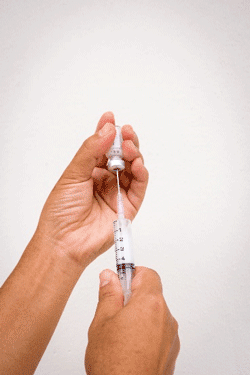What is the birth control injection?
The birth control injection is given to help prevent pregnancy. It contains one hormone (progestin). It doesn’t contain estrogen.
The birth control injection prevents pregnancy by:
- stopping your body from releasing an egg. If you don’t release an egg, you can’t get pregnant.
- decreasing the amount of cervical mucous and making it thicker. This slows the movement of sperm, making it harder for them to get to the uterus.
- making the lining of the uterus thin
How well does the injection work?
- With typical use (this means not following the exact directions) the injection is
94% effective.
- With perfect use (this means you follow the exact directions all the time) the injection is
99.8% effective.
- The injection doesn’t protect you from sexually transmitted infections (STIs) and HIV.
How do I use the injection?
The birth control injection is given by a health care provider. You need a prescription for the injection. It needs to be given every 12 to 13 weeks in the arm or buttocks.
There are different ways to start the injection. If you get your first injection:
- during the first 5 days of your period, it takes 24 hours to become effective. Consider using an extra form of birth control (like condoms or abstinence) during this time
- at any other time, you need to use an extra form of birth control (like condoms or abstinence) for 7 days
How will the injection affect my period?
You can have spotting or bleeding between periods. If the bleeding is heavy or doesn’t stop, talk to your health care provider.
Your period might stop. After one year, 46% of people stop having a period. After 2 years, up to 68% of people stop having a period. This is not harmful.
What are the benefits of the injection?
- It can be used by people who can’t take estrogen because of health problems.
- One injection lasts 12 weeks.
- It may lower your risk of endometrial and ovarian cancer.
- It might decrease period cramps.
- It might decrease symptoms of endometriosis, premenstrual syndrome (PMS), and chronic pelvic pain.
What are the side effects of the injection?
The injection can cause:
- mild headaches
- acne
- depression
- tender breasts
- less interest in sex
- upset stomach (nausea)
- weight gain
If you are concerned about the side effects, talk to your health care provider.
What are the risks of the injection?
When you stop getting the injection, it can take several months for your body to start to release eggs. After people stop using the injection, about 50% will be pregnant at 1 year and about 90% will be pregnant by 2 years if not using any other birth control method.
The injection can increase your risk of thinning bones (bone mineral loss or osteoporosis). Bone mineral loss is usually temporary and goes away when you stop. The risk may increase if you are on the injection for a long time. If you’ve used the injection for 2 years, talk to your health care provider about bone mineral loss.
Is there anything that increases my risk of bone mineral loss?
The risk of thinning bones is higher if you:
- have weak or brittle bones
- have a family history of osteoporosis
- have a small body frame
- have an eating disorder
- smoke
- exercise very little or not at all
- eat or drink lots of caffeine or alcohol
- take steroids (like prednisone)
You can help keep your bones healthy if you:
- eat foods high in calcium and vitamin D (like milk and yogurt)
- take calcium and vitamin D supplements (talk to your pharmacist)
- don’t smoke
- limit alcohol and caffeine
- do weightbearing exercises (like walk, run, or dance) every day
What if I miss or I’m late for my injection?
If your last injection was
13 to 14 weeks ago, you should still be protected from pregnancy. You need to have your injection
right away and before 14 weeks have passed.
If your last injection
was over 14 weeks ago:
- use a backup form of birth control
- see your health care provider right away for your next injection
- if you’ve had unprotected sex, get
emergency contraception (levonorgestrel or copper IUD)
What else do I need to know about the birth control injection?
- You can get pregnant as soon as you stop using the injection, even if your periods are not regular.
- The injection is not affected by most medicines.
- Don’t use the injection if you’re pregnant or think you might be.
What else is important to know about consent, sexual activity, and birth control?
- You have the right to decide to have sex or not. Talk with your partner or partners about consent.
- There’s an 85% chance of becoming pregnant within one year, if no birth control is used for vaginal sex.
- Use a condom every time you have sex (oral, vaginal, anal). Condoms help prevent pregnancy, STIs, and HIV.
- You can lower your risk of HIV by taking an HIV prevention pill every day. Many Albertans can get it for free. Visit
HIV PrEP to find out more.
- Transgender and gender diverse people who have a uterus can use hormonal birth control. It can help prevent pregnancy and make periods lighter and less painful.
- Many sexual health clinics offer some types of birth control for no cost for those who qualify.
Where can I find more information?
If you have questions, need to find a sexual health clinic near you, or want more information, call Health Link at 811 anytime, day or night, to talk to a registered nurse.
